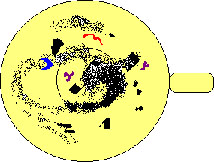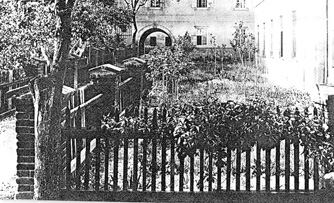Chance
lecturer: Professor F.C.T. Moore



Human beings have recognised chance as such
for thousands of years, in "games of chance". For instance, dice
for "gaming" have been found in Egyptian tombs dating to before 2000 B.C.E.,
in Chinese excavations dating back to 600 B.C.E., and in Etruscan excavations
(in Italy) of the earlier part of the first millennium B.C.E.. They
were known to native Americans from an early period, as well as in Africa,
among the South Sea Islanders and the Inuit, and they are mentioned in
the Mahabharata (the Indian Sanskrit epic dating to 2000 B.C.E.).
Chance events have also been used in many
human cultures as guides to the future. Oracle bones, intestines
of animals, tea leaves in a cup, the movements of a bird, and so on, are
"interpreted" by "seers" or fortune-tellers who are supposed to be able
to give you advice or information about what will happen to you.
It is easy to judge these practices as mere superstition, which is what
I personally incline to do, but it is conceivable that the configurations
produced in these chance events might provide clues for the development
of events occurring elsewhere, since patterns in nature do recur in apparently
quite unconnected areas. For instance, the form of the erect male
sexual organ is repeated frequently in nature, for instance in a species
of mushroom, the phallus impudicus. Is this an "accident",
or not ? This example is given by the French mathematician, René
Thom, a winner of the Fields medal, who developed a form of qualitative
dynamics to model discontinuous change and morphogenesis (the coming into
being of forms)note.

Thus human games and fortune-telling sometimes
involve human creation or use of chance events. But we also encounter
chance in our lives. Natural disasters, for instance, appear to ordinary
human beings as chance or unpredictable events. Consider the wonderful
and unequalled 13th century frescoes of Cimabue in Assissi, destroyed for
ever by an earthquake in central Italy in September 1997. Consider,
again, the development of marine commerce. The trader might invest
a great deal in goods to be sent by ship to another place and there exchanged
for other goods. The loss of a ship could cause financial ruin.
Thus developed marine insurance. The early forms are known in English as
bottomry and respondentia.
"Bottomry" was a contract on a ship's hull
(or "bottom") by which the owner took out a loan repayable only if the
ship arrived safely. Suppose the ship is worth $100,000 which you
cannot afford to lose. You go to someone willing to take the risk,
and take a loan on the security of the ship for this amount, but which
has to be repaid at $130,000 (say). If the ship arrives safely, you
have to pay back more than the ship is worth, which reduces your profit
on the voyage. But if it is lost, you keep the $100,000, and can
buy another one. Respondentia was a similar contract
taken out on the cargo, rather than the hull. Ancient Roman law at
one stage limited the premium (which literally meant a "reward" - for making
the loan) to 12%, but there are records of premia up to 100%.
Marine insurance of this kind was known in ancient
Babylon (more than five thousand years ago), in Ancient Greece, five centuries
B.C.E., and was reinvented by Arab traders in the medieval period.
In fact, the English word "hazard" (a game of dice, a losing move in playing
dice, chance, danger, insurance risk), probably comes through Spanish from
the Arabic word meaning "dice". (Though another etymology says that
the Crusaders "invented" the game of dice to pass the time while they were
besieging a fortress in Palestine, a thousand years ago, and that it was
named after the fortress.) Marine insurance (and insurance in general)
was, and is, a method of coping with apparently "chance" events.
Note that in many jurisdictions (for instance in English or French law), some contracts depending on chance events, as in gambling, are not enforceable at law. English laws on marine insurance have, for hundreds of years, prohibited the insurance of goods or vessels in which you do not yourself have an interest; while Islam has a more general prohibition on all "aleatory contracts".
The history of human reactions to chance is fascinating. But what does it have to do with science ?
Some early Greek thinkers gave chance an essential part in the working of the world. The ancient Greek atomists believed that everything consisted simply of tiny particles of matter, or "atoms" as they called them ("things that cannot be divided"). These just fell through empty space. But if this were all that happened, the universe would just be like an eternal, universal and undifferentiated rainfall. But the world we know is structured, rather than undifferentiated. To explain this, the atomists added chance. They said that sometimes an atom would change its path, purely by chance. When that happened, it would hit other atoms, and would cause swirling. These swirls made up all the objects we see around us, including human beings.
But there is a strong tradition of scientific thought, especially in modern times, which says that chance should not play a part in science. After all, if we say that something occurs by chance, is that not eo ipso to say that it cannot be explained? And is it not the whole point of science to explain things? Thus, methodologically, according to this point of view, science must reject chance. Remember Einstein's famous remark, expressing his doubts about quantum mechanics: "God does not play at dice."
In the sixteenth century was born "The Mechanical Philosophy". The Universe as a whole, and each complex part of it, could be regarded as a machine. This powerful idea was at the origin of the tremendous theoretical and practical successes of modern science.

Because explaining what happens is the purpose
of science, it is bad to allow oneself to say that something has no explanation,
but just happens by chance. Take the case of Mendel. He was
a monk who studied pea plants in the nineteenth century, and whose work
was the foundation for the science of genetics. Garden pea-plants
vary in a number of ways. They can be tall or dwarf, colour may be
present in the blossoms, or absent, and there are variations in the colour
and shape of the peas themselves (the seeds). One might think that
these kinds of variation are just a matter of chance. But he said, surely
there must be a pattern, an explanation. He postulated the existence
of recessive and dominant genes in parent plants. The corresponding
gene in the offspring would be a combination of those of the parents.
The presence of one dominant gene in the offspring would be enough to produce
the characteristic, whereas an offspring carrying one recessive gene could
pass it on, in turn, but would not display the characteristic. This
brilliant hypothesis was the foundation of modern genetic theory.
Determinism is the position according to which, as the philosopher Kant put it, "every event has a cause". By the early nineteenth century, determinism had become the standard scientific orthodoxy, most famously expressed by Laplace, who did a thought experiment. Imagine a superhuman intelligence capable of grasping both the position at any time of every particle in the universe and all the forces acting upon it. For such an intelligence "nothing would be uncertain and the future, as the past, would be present to its eyes. The human mind offers, in the perfection which it has been able to give to astronomy, a feeble idea of this intelligence." Thus the Universe is seen as a perfect causal nexus.
But not everyone has accepted this picture. Many sciences employ statistical methods. What does this imply ? Laplace, himself a pioneer of probability theory, thought that the superhuman intelligence would have no need for probability theory. We need statistics only because of our ignorance of the real causal structure of the world. Chance is not real. But Jacques Monod (Chance and Necessity) distinguished between absolute and operational chance. The dice fall in accordance with the laws of physics, but we can, operationally, treat the number which comes up as chance or random, since it is not feasible in practice to predict the result of throwing the dice by applying the laws. On the other hand, according to Monod, some events involve the intersection of "independent causal chains", and these are inherently or absolutely chance events. There is interesting anthropological material relevant to this idea. Most people agree with Monod's basic position. But you can click here for an interesting contrary view.
And consider physics too. In radioactive decay, two identical atoms will decay at different times, following only laws of probability. This also seems to suggest that chance is real, as the ancient atomists believed.
So the assumptions of the mechanical philosophy are challenged. Quantum physics gives a fundamental role to chance, in the sense indicated above. Neo-Darwinian evolutionary theory also gives an essential role to chance. This is because evolutionary theory requires on the one hand the predominant necessity of genetic transimission which Mendel first made an object of scientific enquiry, and, on the other, random mutation of the genetic material upon which natural selection can work.
The question therefore is whether the mechanical philosophy is at an end. When Einstein asked whether God played at dice, he was expressing, I suppose, the traditional assumption that the rejection of chance was a methodological requirement for proper scientific work. Statistics would come in (say in the theory of gases) only where it is not possible in practice for us to obtain full knowledge of the underlying deterministic processes. But perhaps the answer to Einstein's question is yes. Perhaps the model of the world as a mechanism is incorrect, even though it lingers among philosophers. Daniel Dennett, for example, thinks it obvious that mechanism is the model. No doubt because of the past success of this model. But we now have reasons to doubt it.
An attack on determinism was made one hundred years ago by the American "pragmatists", Peirce and James. Forty years ago, Bohm attempted a compromise.
Next time, you must bring to our meeting prepared questions about chance. The questions should be clearly expressed and written or printed, and you should add a brief explanation of why you ask them. I shall collect them at the beginning of our meeting, and try to answer at least some of them.
Monod, Jacques, Chance and Necessity : an essay on the natural philosophy of modern biology, Collins, 1972 (translation by A. Wainhouse of Le Hasard et la nécessité, Paris, 1970)
Hacking, Ian, The Taming of Chance, Cambridge University Press, 1990

